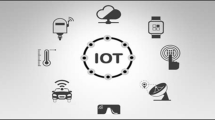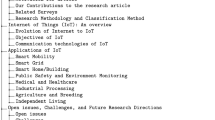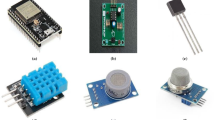Abstract
In today’s advanced applications, such as memory interfaces, feature-based detection, and sensory games, human-computer interaction (HCI) plays a pivotal role. A medical decision support system (MDSS) emerges from the integration of a data system with resources for medical decision-making. Within MDSS, human-computer interaction and perceptual medical decision-making stand out as two highly valuable technologies. Systems enabled by the Internet of Things (IoT), which leverage decentralized, diverse communication and networking technology to cater to a wide range of end-users, are referred to as pervasive computing. A challenging aspect of pervasive computing is ensuring transparency in interaction, managing administration levels, and accommodating varying tolerance levels for widely dispersed users. This paper presents a uniquely flexible MDSS framework designed to enhance end-user confidence in the availability of MDSS through ubiquitous IoT devices within the context of HCI. This architecture utilizes recurring training to assess resource allocation based on demand and collaborative characteristics. Projected resource requirements enable pervasive computing to better serve end-users by reducing latency and increasing communication speeds for MDSS in HCI. The primary goal of this framework is to simplify the management of terminal transitions by facilitating the allocation and utilization of resources for data transfer from peripheral technology. Experimental analysis is employed to estimate the framework’s performance, utilizing various metrics to demonstrate its consistency. These metrics encompass responsiveness, transaction success rates, processed demands, application caseloads, capacity utilization, and memory usage. The uniquely flexible and distributed computing framework optimizes request handling, network accuracy, and memory utilization, resulting in reduced transaction failures and lower latency, ultimately leading to shorter response times. The proposed UFDSS maintains a transaction failure rate below 25% with increasing requests and achieves 100 MHz bandwidth utilization, surpassing other techniques capped at 80 MHz. UFDSS exhibits a lower average latency of around 30 ms for a range of energy data inputs. This uniquely flexible MDSS framework showcases its potential to enhance MDSS availability through IoT devices within HCI contexts. By optimizing resource allocation and utilization, it successfully reduces latency, improves communication speeds, and ultimately leads to shorter response times, contributing to more efficient and reliable medical decision support. Further, integrating generative AI into MDSS for IoT-based HCI could also enhance data-driven decision support.







Similar content being viewed by others
Data Availability
The manuscript does not contain any associated data.
References
Alam A, Qazi S, Iqbal N, Raza K. Fog, edge and pervasive computing in intelligent Internet of Things driven applications in healthcare: challenges, limitations and future use. Fog, edge, and pervasive computing in intelligent IoT driven applications. 2020. p. 1–26.
Becker C, Julien C, Lalanda P, Zambonelli F. Pervasive computing middleware: current trends and emerging challenges. CCF Trans Perv Comput Interact. 2019;1:10–23.
Gutiérrez F, Htun NN, Schlenz F, Kasimati A, Verbert K. A review of visualisations in agricultural decision support systems: an HCI perspective. Comput Electron Agric. 2019;163:104844.
Ayed MB, Ltifi H, Kolski C, Alimi AM. A user-centered approach for the design and implementation of KDD-based DSS: a case study in the healthcare domain. Decis Support Syst. 2010;50(1):64–78.
Wang J, Zhao Y, Balamurugan P, Selvaraj P. Managerial decision support system using an integrated model of AI and big data analytics. Ann Oper Res. 2022. 1–18.
Reichle R, Wagner M, Khan MU, Geihs K, Lorenzo J, Valla M, Fra C, Paspallis N, Papadopoulos GA. A comprehensive context modeling framework for pervasive computing systems. In: Distributed Applications and Interoperable Systems: 8th IFIP WG 6.1 International Conference, DAIS 2008, Oslo, Norway, June 4-6, 2008. Proceedings 8. Springer; 2008. p. 281–95
Kulkarni D, Tripathi A. Context-aware role-based access control in pervasive computing systems. In: Proceedings of the 13th ACM Symposium on Access Control Models and Technologies. 2008. p. 113–22.
Ltifi H, Kolski C, Ayed MB. Combination of cognitive and HCI modeling for the design of KDD-based DSS used in dynamic situations. Decis Support Syst. 2015;78:51–64.
Jagatheesaperumal SK, Mishra P, Moustafa N, Chauhan R. A holistic survey on the use of emerging technologies to provision secure healthcare solutions. Comput Electr Eng. 2022;99:107691.
Liu S, Hudson Smith M, Tuck S, Pan J, Alkuraiji A, Jayawickrama U. Where can knowledge-based decision support systems go in contemporary business management-a new architecture for the future. J Econ Bus Manage. 2015;3(5):498–504.
Salsabila N, Hasdiana H, Irwan D. The design of an installation payment decision support system for the prospective home credit customers using the multi-attributive border approximation area comparison method. Int J Data Sci Vis (IJDSV). 2023;1(1).
Rundo L, Pirrone R, Vitabile S, Sala E, Gambino O. Recent advances of HCI in decision-making tasks for optimized clinical workflows and precision medicine. J Biomed Inform. 2020;108:103479.
Dhouib A, Kolski C, Neji M. Toward a web-based multi-criteria decision support system for the layered evaluation of interactive adaptive systems. Univ Access Inf Soc. 2023;22(2):415–43.
Yu G, Chen Z, Wu J, Tan Y. Medical decision support system for cancer treatment in precision medicine in developing countries. Expert Syst Appl. 2021;186:115725.
Kim D, Lee J, Woo Y, Jeong J, Kim C, Kim D-K. Deep learning application to clinical decision support system in sleep stage classification. J Personal Med. 2022;12(2):136.
Ahmad B, Sun J, You Q, Palade V, Mao Z. Brain tumor classification using a combination of variational autoencoders and generative adversarial networks. Biomedicines. 2022;10(2):223.
Liu P, Fels S, West N, Görges M. Human computer interaction design for mobile devices based on a smart healthcare architecture. arXiv:1902.03541 [Preprint]. 2019. Available from: http://arxiv.org/abs/1902.03541.
Goumopoulos C, Mavrommati I. A framework for pervasive computing applications based on smart objects and end user development. J Syst Softw. 2020;162:110496.
Bolgova KV, Kovalchuk SV, Balakhontceva MA, Zvartau NE, Metsker OG. Human computer interaction during clinical decision support with electronic health records improvement. In: Research Anthology on Decision Support Systems and Decision Management in Healthcare, Business, and Engineering. IGI global. 2021. p. 1316–30.
Tariq U, Ahanger TA, Nusir M, Ibrahim A. A pervasive computational intelligence based cognitive security co-design framework for hype-connected embedded industrial IOT. Int J Comput Commun Control. 2021;16(2).
Suma DV. Wearable IoT based distributed framework for ubiquitous computing. J Ubiquitous Computing Commun Technol. 2021;3(1):23–32.
Cao L, et al. Design and optimization of a decision support system for sports training based on data mining technology. Sci Program. 2022;2022.
Javed AR, Saadia A, Mughal H, Gadekallu TR, Rizwan M, Maddikunta PKR, Mahmud M, Liyanage M, Hussain A. Artificial intelligence for cognitive health assessment: state-of-the-art, open challenges and future directions. Cognit Comput. 2023;1–46.
Santos MA, Munoz R, Olivares R, Rebouças Filho PP, Del Ser J, de Albuquerque VHC. Online heart monitoring systems on the internet of health things environments: a survey, a reference model and an outlook. Inf Fusion. 2020;53:222–39.
Zhang D, Liu X, Xia J, Gao Z, Zhang H, de Albuquerque VHC. A physics-guided deep learning approach for functional assessment of cardiovascular disease in IoT-based smart health. IEEE Internet Things J. 2023.
Parah SA, Kaw JA, Bellavista P, Loan NA, Bhat GM, Muhammad K, de Albuquerque VHC. Efficient security and authentication for edge-based Internet of Medical Things. IEEE Internet Things J. 2020;8(21):15652–62.
Dourado CM, da Silva SPP, da Nobrega RVM, Reboucas Filho PP, Muhammad K, de Albuquerque VHC. An open IoHT-based deep learning framework for online medical image recognition. IEEE J Select Areas Commun. 2020;39(2):541–8.
Huang C, Xu G, Chen S, Zhou W, Ng EY, de Albuquerque VHC. An improved federated learning approach enhanced internet of health things framework for private decentralized distributed data. Inf Sci. 2022;614:138–52.
Chen J, Zheng Y, Liang Y, Zhan Z, Jiang M, Zhang X, da Silva DS, Wu W, de Albuquerque VHC. Edge2Analysis: a novel AIoT platform for atrial fibrillation recognition and detection. IEEE J Biomed Health Inform. 2022;26(12):5772–82.
Author information
Authors and Affiliations
Corresponding author
Ethics declarations
Ethics Approval
This article does not contain any studies with human participants or animals performed by any of the authors.
Competing Interest
The authors declare no competing interests.
Additional information
Publisher's Note
Springer Nature remains neutral with regard to jurisdictional claims in published maps and institutional affiliations.
Rights and permissions
Springer Nature or its licensor (e.g. a society or other partner) holds exclusive rights to this article under a publishing agreement with the author(s) or other rightsholder(s); author self-archiving of the accepted manuscript version of this article is solely governed by the terms of such publishing agreement and applicable law.
About this article
Cite this article
Gou, H., Zhang, G., Medeiros, E.P. et al. A Cognitive Medical Decision Support System for IoT-Based Human-Computer Interface in Pervasive Computing Environment. Cogn Comput (2024). https://doi.org/10.1007/s12559-023-10242-4
Received:
Accepted:
Published:
DOI: https://doi.org/10.1007/s12559-023-10242-4




